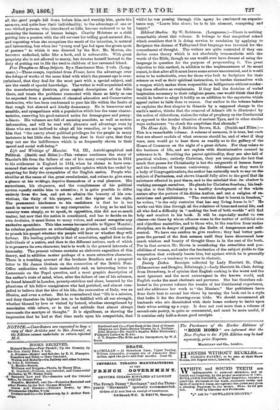Life and Writings of Mazzini. Vol. DI, Autobiographical and Political.
(Smith and Eider.)—This velum° continues the story of Mazzini's life from the failure of one of his many conspiracies in 1831 to his settlement in England in 184 when he claims to have com- menced that series of operations on public opinion which has ended by acquiring for Italy the sympathies of the English nation. People who shudder at the name of the great revolutionist, and rawest° give -even a gdance at his writings, deprive themselves of a real pleasure. His earnestness, his eloquence, and the completeness of his political system equally entitle him to attention ; it is quite possible to differ entirely from the last, and yet to admire the honesty of bin con- victions, the fixity of his, purpose, and the vigour of his style. The permanent hindrance to his usefulness is that he is too much in earnest to consent to anyerenpretnaise. As kng on he and his estuntry wen* simply, so 30 speak, in oppesition,_this did nasomuc.h matter, but now that the nation in constituted, and has to deoide on its own destinies, it must listen to many voices, and cannot reeograisse -any exchisive apostelete. This idea SeellaS inconceivable to Signor Mazzini ; he rebukes parliaments as unhesitatingly as princes, and will continue to preach his ,gespel whether the people will hear or whether they -will forbear. His leading principle is that of association, applied first to the individuals of a nation, and then to the different nations, each of which is to preserve its own character, but is to work in the general interests of humanity. The present volume contains an elaborate exposition of this theory, and in addition matter perhaps of a more attractive character. There is a touching account of the brothers Bandiera and a pungent letter to Sir James Graham on the connection of the British Post- Office authorities with their melancholy end, an interesting letter to Lamennais on the Papal question, and a most graphic description of the author's state of mind, when, after the failure of one of his schemes, he found himself in London, poverty-stricken and alone, haunted by the phantoms of his fellow conspirators who had perished, and almost com- pelled to believe that the idea of his life, the restoration of Italy, was an illusion, and even a crime. lint he remembered that "life is a mission, and duty therefore its highest law, to be fulfilled with all our strength, whether blessed by love or visited by hatred, whether strengthened by association with others, or in the sad solitude that almost always surrounds the martyrs of thought." It is significant, as showing the Impression that he had at that time made upon his compatriots, that whilst be was passing through -this agony ho overheard em-Reppyain- tones say, "Leave him alone; he is in his element, eonspirimg and happy."






























 Previous page
Previous page